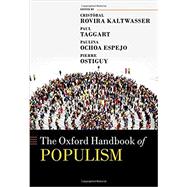
The Oxford Handbook of Populism
by Rovira Kaltwasser, Cristobal; Taggart, Paul A.; Ochoa Espejo, Paulina; Ostiguy, Pierre-

This Item Qualifies for Free Shipping!*
*Excludes marketplace orders.
Buy New
Rent Textbook
Rent Digital
Used Textbook
We're Sorry
Sold Out
How Marketplace Works:
- This item is offered by an independent seller and not shipped from our warehouse
- Item details like edition and cover design may differ from our description; see seller's comments before ordering.
- Sellers much confirm and ship within two business days; otherwise, the order will be cancelled and refunded.
- Marketplace purchases cannot be returned to eCampus.com. Contact the seller directly for inquiries; if no response within two days, contact customer service.
- Additional shipping costs apply to Marketplace purchases. Review shipping costs at checkout.
Summary
The Oxford Handbook of Populism is divided into four sections. The first presents the main conceptual approaches on populism and points out how the phenomenon in question can be empirically analyzed. The second focuses on populist forces across the world and includes chapters on Africa, Australia and New Zealand, Central and Eastern Europe, East Asia, India, Latin America, the Post-Soviet States, the United States, and Western Europe. The third reflects on the interaction between populism and various relevant issues both from a scholarly and political point of view. Amongst other issues, chapters analyze the relationship between populism and fascism, foreign policy, gender, nationalism, political parties, religion, social movements and technocracy. Finally, the fourth part includes some of the most recent normative debates on populism, including chapters on populism and cosmopolitanism, constitutionalism, hegemony, the history of popular sovereignty, the idea of the people, and socialism.
The handbook features contributions from leading experts in the field, and is indispensible, positioning the study of populism in political science.
Author Biography
Cristobal Rovira Kaltwasser, Associate Professor of Political Science, Diego Portales University, Santiago, Chile,Paul A. Taggart, Professor of Politics and Jean Monnet Chair, University of Sussex,Paulina Ochoa Espejo, Associate Professor of Political Science, Haverford College,Pierre Ostiguy, Assistand Professor of Political Studies, Universidad Catolica de Chile
Cristobal Rovira Kaltwasser is an Associate Professor of Political Science at Diego Portales University in Santiago de Chile. His publications include Populism: A Very Short Introduction% (with Cas Mudde, OUP, 2017), and has published articles in journals such as Comparative European Politics, Democratization, Government & Opposition, Latin American Research Review and Political Studies.
Paul Taggart is Professor of Politics and Jean Monnet Chair, Director of the Sussex European Institute, former editor of Government and Opposition, former editor of the journal Politics, co-convenor (with Prof. Aleks Szczerbiak) of the European Referendums, Elections and Parties Network (EPERN). His publications include The New Populism and the New Politics (Palgrace, 1996) and Opposing Europe? The Comparative Party Politics of Euroscepticism, Vols I and II (co-edited with Aleks Szczerbiak, OUP, 2008).
Paulina Ochoa Espejo is an Associate Professor of political science at Haverford College. Her publications include The Time of Popular Sovereignty: Process and the Democratic State (Penn State University Press, 2011) and has publsihed articles in journals such as the American Journal of Political Science, the Journal of Political Philosophy and the Journal of Politics.
Pierre Ostiguy is an Assistant Professor of Political Studies at the Universidad Catolica de Chile. His publications include the forthcoming work Party Systems and Political Appeals: Populism and Anti-Populism in Argentina (University of Notre Dame Press, 2017).
Table of Contents
Preface
1. Populism: An Overview of the Concept and the State of the Art, Cristobal Rovira Kaltwasser, Paul Taggart, Paulina Ochoa Espejo, and Pierre Ostiguy
Concepts
2. Populism: an Ideational Approach, Cas Mudde
3. Populism: a Political-Strategic Approach, Kurt Weyland
4. Populism: a Socio-Cultural Approach, Pierre Ostiguy
Regions
5. Populism in Africa, Danielle Resnick
6. Populism in Australia and New Zealand, Benjamin Moffitt
7. Populism in Central and Eastern Europe, Ben Stanley
8. Populism in East Asia, Olli Hellmann
9. Populism in India, Christophe Jaffrelot and Louise Tillin
10. Populism in Latin America, Carlos de la Torre
11. Populism in the Post-Soviet States, Luke March
12. Populism in the United States, Joseph Lowndes
13. Populism in Western Europe, Paul Taggart
Issues
14. Populism and its Causes, Kirk A. Hawkins, Madeleine Read, and Teun Pauwels
15. Populism and Political Parties, Kenneth Roberts
16. Populism and Social Movements, Paris Aslanidis
17. Populism and Technocracy, Christopher Bickerton and Carlo Invernizzi Accetti
18. Populism and Nationalism, Benjamin de Cleen
19. Populism and Fascism, Roger Eatwell
20. Populism and Foreign Policy, Bertjan Verbeek and Andrej Zaslove
21. Populism and Identification, Francisco Panizza
22. Populism and Gender, Sahar Abi-Hassan
23. Populism and Religion, Jose Pedro Zuquete
24. Populism and the Media, Luca Manucci
25. Populism and the Question of How To Deal With It, Cristobal Rovira Kaltwasser
Normative Debates
26. Populism and the History of popular Sovereignty, Duncan Kelly
27. Populism and Hegemony, Yannis Stavrakakis
28. Populism as a Threat to Liberal Democracy, Stefan Rummens
29. Populism and the Principle of Majority, Nadia Urbinati
30. Populism and Constitutionalism, Jan-Werner Mueller
31. Populism and the Idea of the People, Paulina Ochoa Espejo
32. Populism and Praxis, Jason Frank
33. Populism and Cosmopolitanism, James D. Ingram
34. Populism in the Socialist Imagination, Kevin Olson
An electronic version of this book is available through VitalSource.
This book is viewable on PC, Mac, iPhone, iPad, iPod Touch, and most smartphones.
By purchasing, you will be able to view this book online, as well as download it, for the chosen number of days.
Digital License
You are licensing a digital product for a set duration. Durations are set forth in the product description, with "Lifetime" typically meaning five (5) years of online access and permanent download to a supported device. All licenses are non-transferable.
More details can be found here.
A downloadable version of this book is available through the eCampus Reader or compatible Adobe readers.
Applications are available on iOS, Android, PC, Mac, and Windows Mobile platforms.
Please view the compatibility matrix prior to purchase.